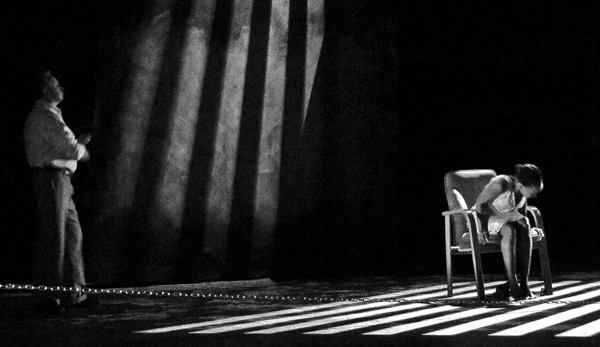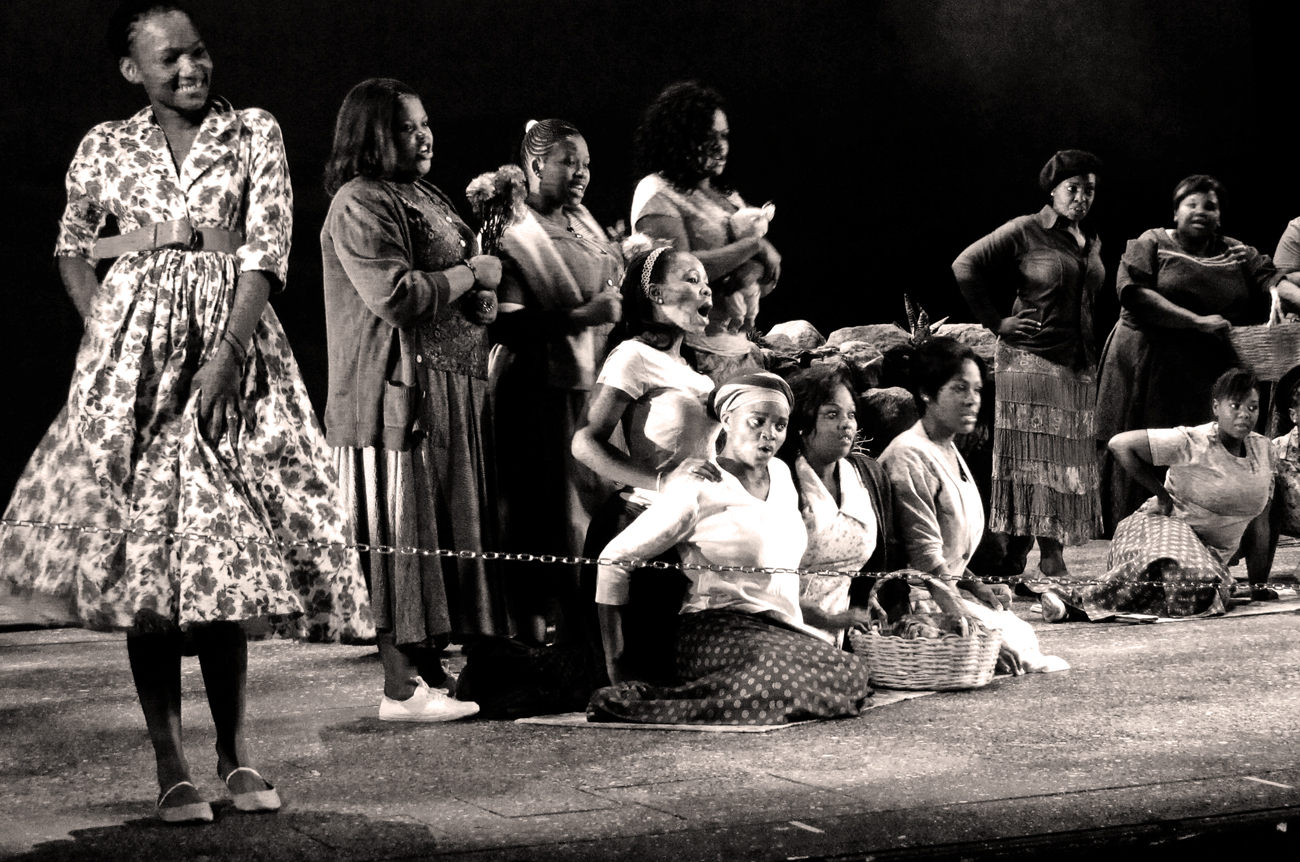And so, in late April and early May, Nomzamo Winfreda Madikizela-Mandela has been transformed into the symbol of endurance against odds in Bongani Ndodana-Breen’s new opera, “Winnie”; while in Aubrey Sekhabi and Paul Grootboom’s play, “Rivonia Trial,” she is the haunting symbol of Nelson Mandela’s love, longing and loss.
Ndodana-Breen had promised an opera that would break free of the Western operatic template, using traditional indigenous Xhosa musical motifs to help recapitulate the heroine’s life as she prepares to face the Truth and Reconciliation Commission, although the influences of modern composers like Aaron Copland, Leonard Bernstein, John Adams and Philip Glass seem larger still.
Sekhabi and Grootboom’s drama, brought down from its original four-hour running time a year ago to about two-and-a-half hours now, weaves back and forth between the private and public lives of the accused and their defence attorneys in the Rivonia Trial of the early 1960s, as well as at their secret hideout of Liliesleaf Farm. The music matters here too - period standards like MacKay Davashe’s “Lakutshon ‘Ilanga” are woven into the fibre of “Rivonia Trial”.
Taken together, the two works seem positioned as key elements of a national project to present the story of South Africa’s anti-apartheid struggle and give it a sense of wonder and mystery, truth and tragedy, and, above all heroics and heroism. In the process, the works seem designed to breathe an artistic sensibility into dry historical fact.
Every new country – or new political dispensation in an older one – needs such myths to make the regime seem right and fitting. When Shakespeare wrote his histories – all those Richards, Johns, Falstaffs and Henrys – he was not just trying to fill the Globe Theatre with satisfied, paying customers. He was also crafting a vivid national narrative to glorify the legitimacy and inevitability of his sovereign, Elizabeth I, and her Tudor lineage. The pomp and ceremony of Britain’s recent royal wedding and the massive media coverage of it seems a possible modern equivalent.

Photo: In prison Winnie is tormented by her inquisitor/jailor Swanepoel, sung by Pierre du Toit.
In the early days of the American republic, there were certainly fewer plays about America’s Founding Fathers than there were in Tudor England about its royal heritage, but American politicians and the government they created were immortalised on some very large canvasses. These men in heroic poses were modelled after well-known statues of Roman statesmen.
George Washington himself was frequently compared to the legendary Roman general, Cincinnatus. Cincinnatus had been summoned from his farm, made Rome’s dictator so he could lead his city against the invading Etruscans. With that goal achieved, he voluntarily surrendered his position to return to his day job as a farmer. Washington, as the winning general in the Revolutionary War, retired after the war and was recalled from his farm to become America’s first president, only to retire again after his two terms of office. Washington fully understood the value of these symbolic comparisons and encouraged them.
In South Africa, during the apartheid era, the regime’s top echelon imposed their names on the physical and economic geography of the country. Highways were named after forgotten functionaries like transport minister Ben Schoeman, and the country ended up with hundreds of JG Strydom, DF Malan and HF Verwoerd drives. The new regime is still forging ahead with its great renaming as well. The country now has street names ranging from Mao Zedong Road to Joe Slovo and Thabo Mbeki drives. Of course, dozens of King’s Arms taverns in America suddenly became Liberty taverns after 1781. “Plus ça change, plus c'est la même chose” one might say. Or as Kurt Vonnegut would have shrugged, “And so it goes.”
Both “Winnie” and “Rivonia Trial” were consciously created to guide people in the contemplation of this country’s icons. “Rivonia Trial” is structured with scenes depicting the ANC high command’s secret meetings at Liliesleaf Farm and the trial that ensues once the police discover the farm’s real purpose, as well as brief clandestine meetings between Winnie and Nelson Mandela. For continuity’s sake, Albertina Sisulu, Hilda Bernstein and Winnie Mandela step forward to address the audience, soliloquy-style to alert us to what is next. Among a cast of some of the country’s finest actors, Sello Maake ka-Ncube delivers an uncanny impression of Nelson Mandela, especially with the very verbal tics that have now become so familiar in the former president’s style. Macks Papo offers a thoughtful Walter Sisulu and Xolile Tshabalala gives us a youthful, sensual Winnie. This, of course, is Winnie before she has been assailed from her banishment and the ultra-harsh interrogations, and then forced to raise a family on her own – and also before she slides into the heart of darkness that was her “football club” in Soweto.
Too often, however, rather than infusing the characters with high octane energy and vivid debate, the work’s texture has the sound of that implacable machinery of history, moving towards victory. Then, despite this triumphal pitch, after the sentences are pronounced, there are final words from the wives, the prisoners are led away and then the audience is left to shuffle out of the theatre, past the prisoners now positioned inside theatre administrative offices, turned into prison cells.
We miss what must surely have happened – knock down, drag out arguments between proponents of violence or non-violence, between secret action or mass movements - or even a real glimpse of what the high command really wants to achieve. Mandela’s famous speech from the dock is the work’s moral centre, but we remain uncertain about what lies beyond it towards the periphery.

Photo: Otto Maidi sings the role of Columbus Madikizela (Winnie's father). Columbus' solo as he worries about his daughter's life.
Meanwhile, right next door to “Rivonia Trial”, Tsakane Maswanganyi, as Winnie, sings of her day as she comes before the Truth and Reconciliation Commission. “Winnie: the Opera” is built out of a series of flashbacks. First is her incarceration in prison and torment by her jailer, then a still-earlier moment in Pondoland as she sings of her love for the brave, strong man who will lead people out from under the thumb of the oppressor. The second act takes us to her banishment to the remote township of Brandfort in the Free State, then on to the Mandela Football Club, the infamous necklacing-and-matches speech and the death of Stompie Seipei. The work comes full circle, returning to the moment of her testimony before Archbishop Desmond Tutu and the rest of the TRC, the media herd and her accusers. “Winnie: the opera” tackles ground that has also been worked in Philip Miller’s cantata, “Rewind”, a work that gets a new performance in Cape Town, in mid-May.
In an effort to infuse “Winnie” with an operatic-style redemption and a moral high ground after Tutu begs her to confess her complicity with her football club’s reign of violence, Winnie has a kind of apotheosis when she sings that, indeed, she is very sorry for what happened. But this may be an awkward moment. At her actual TRC hearing, Winnie Madikizela-Mandela’s response was both more complicated and equivocal.
The transcript reads:
TUTU: You are a great person, and you don’t know how your greatness would be enhanced if you were to say, sorry, things went wrong; forgive me. I beg you.
WINNIE: I am saying it is true things went horribly wrong. I fully agree with that. And for that part of those painful years when things went horribly wrong and we were aware of the factors that led to that, for that, I am deeply sorry.
It is here, then, that “Winnie” inches back from giving its protagonist her rich, climactic moment, after her pummelling by her traumatic personal history. “Winnie” delivers a bigger-than-life operatic figure, but then gives her what looks close to a free pass for her past.
South Africa is well on the path to creating commemorations of its troubled history. This is, after all, a country that previously built a giant monument to a language as well as the Voortrekker Monument. But the new era seems almost as eager to carry on this tradition, what with Freedom Park, stationed on the hill opposite that monument. To be fair, there is also the Constitutional Court in downtown Johannesburg, with its inspiring message of justice accessible to all.
With this opera, however, the government has spent about R10 million - funds that could also have underwritten a year’s worth of live drama at a major theatre. The country still needs to embrace its contested historical terrain fully. But in a country where fewer and fewer students study history, there should be more conversation, more controversy, more debate about what actually comprises its history.
On the night of the premiere of “Winnie” there was much speculation about how the real Winnie Madikizela-Mandela would react to the work. It was almost as if the opera was the preliminary drum roll for the “Mother of the Nation” to step on stage and embrace the singer who had just portrayed her.
She didn’t let her audience down. She told the crowd it stunned her that after all these years of wanting to bomb the State Theatre to rubble for what it had once epitomised, here she was, in front of an audience applauding her character on its very stage. There were cheers and ululations, and shouts of “Amandla”. But it was also true that by the time she rose to read her speech, the opera hall was only half-full. DM
For more, read:
- Mandela and the Truth and Reconciliation Commission/Newshour on PBS;
- Winnie the Opera premieres with all eyes on Winnie the spectator in the Guardian (UK);
- Winnie the Opera, the opera’s website;
- Can Winnie Mandela's heroism outshine her crimes? On the BBC website;
- The Rivonia Trial and Liliesleaf Farm in the SA History Archive;
- The Rivonia Trial – the play’s website;
- Rivonia Trial Database at the Nelson Mandela Foundation Centre for Memory;
- Collection Index: RIVONIA TRIAL, MANDELA, Nelson and others 1963-1964 of the University of the Witwatersrand historical collections.
Main photo: The young Winnie tells her family and friends in Pondoland she is going to marry Nelson Mandela. All photos are from 'Winnie: The opera'




